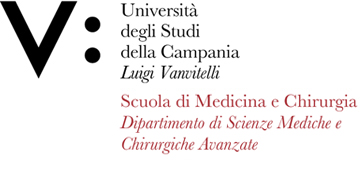Giuseppe LIMONGELLI
Insegnamento di CARDIOLOGIA
Corso di laurea in INFERMIERISTICA (ABILITANTE ALLA PROFESSIONE SANITARIA DI INFERMIERE)
SSD: MED/11
CFU: 1,00
ORE PER UNITÀ DIDATTICA: 15,00
Periodo di Erogazione: Secondo Semestre
Italiano
| Lingua di insegnamento | ITALIANO |
| Contenuti | Il corso si prefigge di dare allo studente una visione generale delle varie patologie dell'apparato cardiovascolare, fornendo spunti di fisiopatologia, eziologia e clinica delle malattie che interessano l'apparato cardiovascolare. Verranno forniti inoltre alcuni cenni essenziali di terapia. Particolare attenzione verrà posta agli aspetti di assistenza infermieristica ai pazienti affetti da malattie dell'apparato cardiovascolare. |
| Testi di riferimento | 1. Harrison's Principi di Medicina Interna (solo la parte che riguarda il sistema cardiovascolare) |
| Obiettivi formativi | Al termine del corso, lo studente deve conoscere le principali patologie del sistema cardiovascolare, saperle inquadrare dal punto di vista nosologico e conoscerne i meccansmi fisopatologici di base. Dovrà inoltre conoscere i principali quadri clinici associati alle varie patologie, nonché le opzioni terapeutiche di base. Infine, lo studente dovrà conoscere in dettaglio gli aspetti assistenziali di stretta pertinenza infermieristica. |
| Prerequisiti | Sono necessarie conoscenze di base sull'anatomia, fisiologia e fisiopatologia dell'apparato cardiovascolare. |
| Metodologie didattiche | Il corso sarà organizzato utilizzando un totale di 15 ore di lezioni frontali, delle quali 7 della durata di due ore e 1 della durata di un'ora. La frequenza è obbligatoria e per accedere all'esame di profitto è necessario avere almeno il 70% delle presenze. Le presenze verranno registrate mediante badge elettronico. |
| Metodi di valutazione | Al termine del corso la verifica del raggiungimento degli obiettivi didattici sarà effettuata mediante prova orale. La prova orale si prefigge di accertare la capacità dello studente di saper inquadrare, in un contesto coinvolgente l'assistenza infermieristica, le varie patologie cardiache. I requisiti minimi per il superamento dell'esame di profitto comprendono la capacità di sintesi, la qualità dell’organizzazione del discorso e dell’esposizione, l'uso del lessico specialistico, la capacità di approfondimenti e di collegamento tra le varie patologie interessanti il sistema cardiovascolare. La prova orale consisterà in un colloquio articolato in domande sugli argomenti oggetto del programma atto ad accertare il livello di conoscenze raggiunto dallo studente. Sarà valutata in trentesimi e il superamento dell’esame si otterrà con un voto minimo di 18/30 |
| Altre informazioni | Verranno utilizzate slides durante le lezioni che potranno essere messe a disposizione degli studenti su richiesta. |
| Programma del corso | PROGRAMMA DI STUDIO. |
English
| Teaching language | ITALIAN |
| Contents | The course aims to give the student a general view of the various diseases of the cardiovascular system, providing insights into the pathophysiology, etiology and clinical of diseases affecting the cardiovascular system. Some essential hints of therapy will also be provided. Particular attention will be given to the aspects of nursing care for patients suffering from diseases of the cardiovascular system |
| Textbook and course materials | 1. Harrison's Principles of Internal Medicine (only the part concerning the cardiovascular system) |
| Course objectives | At the end of the course, the student must know the main pathologies of the cardiovascular system, know how to frame them from the nosological point of view and know the basic physopathological mechanisms. It will also have to know the main clinical pictures associated with the various diseases, as well as the basic therapeutic options. Finally, the student will have to know in detail the nursing aspects of strict nursing relevance |
| Prerequisites | Basic knowledge on the anatomy, physiology and pathophysiology of the cardiovascular system is needed. |
| Teaching methods | The course will be organized using a total of 15 hours of lectures, of which 7 will last two hours and 1 for one hour. Attendance is mandatory and at least 70% of admissions are required to access the exam. Attendance will be recorded using an electronic badge. |
| Evaluation methods | At the end of the course the verification of the achievement of the teaching objectives will be carried out by oral examination. The oral test aims to ascertain the ability of the student to be able to frame, in an involving context nursing care, the various cardiac pathologies. The minimum requirements for passing the examination of profit include the ability to synthesise, the quality of the organization of speech and exposure, the use of specialized vocabulary, the ability to deepen and link the various diseases interesting the system cardiovascular. The oral test will consist of an interview divided into questions on the topics covered by the program to ascertain the level of knowledge achieved by the student. It will be evaluated in thirtieths and the passing of the exam will be obtained with a minimum grade of 18/30. |
| Other information | Slides will be used during lessons that can be made available to students upon request. |
| Course Syllabus | General information on diseases of the cardiovascular system. Memories of anatomy and physiology. Semeiotics and general diagnostics. Congenital heart disease: Interatrial and ventricular septal defects. Patent arterial duct. Congenital aortic stenosis. Aortic coarctation. Tetralogy of Fallot. Rheumatic disease. Valvulopatie: mitral stenosis. Mitral insufficiency. Prolapse of the mitral valve. Aortic stenosis. Aortic insufficiency. Tricuspid and pulmonary valvulopathies. Diseases of the pericardium, of the myocardium and of the endocardium. Cardiac tamponade. Ischemic heart disease: Acute coronary syndromes. Chronic angina pectoris. Acute myocardial infarction. Arrhythmias: Bradyarrhythmias. Tachyarrhythmias with particular regard to atrial fibrillation. Syncope. Heart failure. Hypertension. Atherosclerosis. Diseases of the aorta. |








